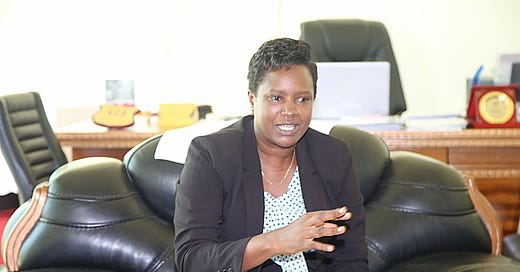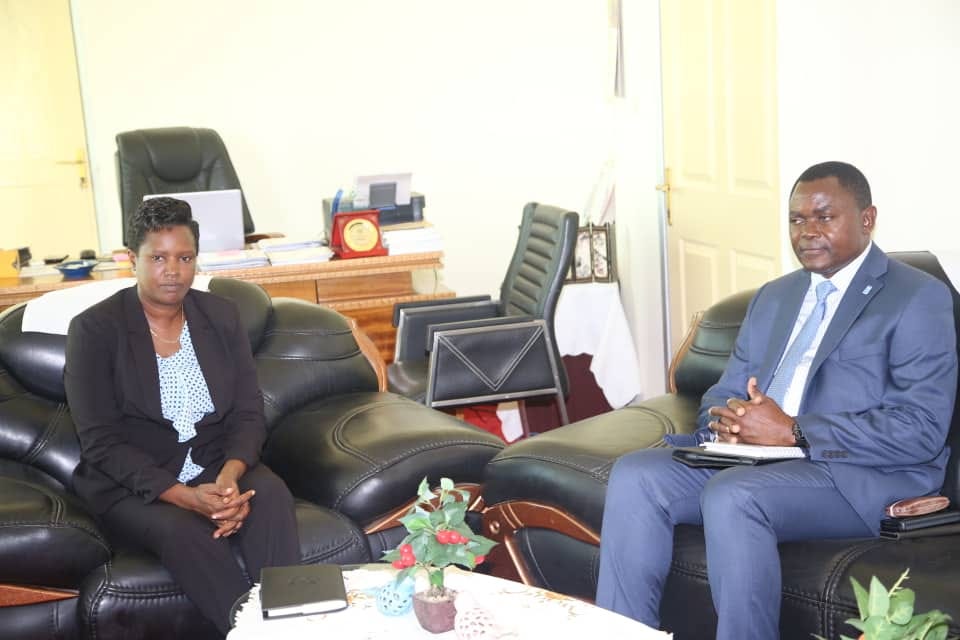A look on the institution of Ombusdman as it open a new chapter
RegionWeek Newsletter Vol VII, Issue #223 | Wednesday, January 4, 2023
Dear Readers,
The Ombudsman of the Republic of Burundi Mrs. Aimée Laurentine Kanyana received on Tuesday, January 3rd, at his Office, the Resident Representative of UNDP Burundi Mr. Mathieu Ciowela. The two officials exchanged important topics related to the mission of the institution of the Ombudsman in Burundi.
A particular focus in their discussion was on the establishment and operationalization of local mechanisms of mediation, dialogue, and reconciliation for social cohesion.
It was an opportunity for Ombudsman Aimée Laurentine Kanyana to share with Mr. Mathieu Ciowela her vision to contribute to the strengthening of female leadership and the empowerment of women as well as the participation of young people in the development of the country.
One of the key initiatives discussed during the meeting was a plan to strengthen cross-border relations between the population of Burundi and the DRCongo in order to facilitate trade and social relations between the two brotherly peoples.
The Ombudsman and the Resident Representative of UNDP Burundi expressed their satisfaction with the existing partnership and are committed to developing effective strategies to seek answers to the major challenges facing Burundi.
Why it matters.
The institution of the Ombudsman is provided for by the constitution of the Republic of Burundi which specifies the mission of the Ombudsman. The institution of ombudsman has the task of analyzing complaints and mediating between the public administration and citizens. The Ombudsman of Burundi also has the mission of conducting investigations into violations of citizens' rights by state authorities or institutions. After carrying out these investigations, the Ombudsman writes a report that he sends to the authorized authorities so that these violations are corrected and that citizens can be restored to their rights.
How it all started
In Burundi, the idea of an Ombudsman emerged in the context of negotiations of Arusha. The institution was adopted by the negotiators and written into the Agreement of Arusha before receiving its constitutional consecration in 2004 and definitively in 2005.
As researcher Desire Ngabonziza notes, despite its foreign origin, the concept of the Ombudsman has a strong sociocultural base. Despite its foreign origin, the concept of an ombudsman has a strong socio-cultural foundation.
It fits perfectly with Burundian traditions where the Bashingantahe intervenes in the fair settlement of disputes through mediation in order to avoid or correct injustices.
In Africa, the institution of the Ombudsman was first introduced in the former English colonies. Tanzania is the first African country to have established an institution, the Permanent Commission of Inquiry (PCE) in 1966, which had the same recognized functions as the Swedish Ombudsman. It was followed by countries like Mauritius in 1968, Ghana in 1969, etc.
It was not until the 1990s that this institution made its debut in French-speaking countries, generally under the name of Mediator of the Republic.
Key achievements
The institution of the Ombudsman has currently a plan that focuses on mediation and peaceful conflict resolution, institutional capacity building, monitoring of good governance, dialogue for conflict prevention, human rights, and communication. The last report made in November 2022 mentions that over 69,930 citizens sent over 1,878 complaints to the Ombudsman throughout the country. Among these complaints, 1286 were deemed admissible, and 592 were rejected.
Currently, over 700 complaints are under investigation, and 502 have been closed by mediation or by recommendations addressed to the competent institutions. During the same period, citizens chosen for their integrity were appointed in 98 communes in the country to mediate conflicts and above all prevent them.
The role of women in mediation
The former Minister of Justice Aimée-Laurentine Kanyana became the first woman and the third person to be elected to this post of Ombudsman after Edouard Nduwimana and Mohammed Khalfan Rukara.
An International Peace Institute study measured the presence of women as negotiators, mediators, and signatories to 182 signed peace agreements between 1989 and 2011 and found that when women participate, peace agreements are 20 percent more likely to last at least two years, and 35 percent more likely to last for 15 years, notes Emma Fearon in her article.
A study of thirty-one major peace processes between 1992 and 2011 by UN Women found that just 2.4 percent of chief mediators were women. Only slightly more women participated formally in peace processes as signatures (4 percent) or as part of negotiating delegations (9 percent).
According to International Peace Institute, today, women hold ten out of seventy-four senior UN mediation positions, or 14 percent of them. It represents a significant increase compared to the 1990s or early 2000s. As recently as 2005, just four women (6.5 percent) occupied senior peace-related positions. Currently, one in three peacekeeping operations is headed by a woman, a milestone in the UN’s history.
Outside the UN system, a small number of women have served as track-one mediators in peace talks sponsored by the African Union (AU) and other institutions, notes the International Peace Institute in one of its briefings.
Notable examples are, the Mozambican politician and humanitarian Graça Machel was one of three mediators for the post-election crisis in Kenya in 2008. In the same year, Liberata Mulamula was one of five international facilitators in the peace conference for the Kivus in Goma, eastern Democratic Republic of the Congo, in her capacity as the Executive Secretary of the International Conference on the Great Lakes region.
The Bottom Line
Burundi made a great move by choosing Mrs. Aime Laurentine Kanyana as an Ombudsman. Women are integral to the peacebuilding process, and the involvement of civil society organizations, including women’s groups, makes a peace agreement 64 percent less likely to fail.
It is too early to speculate whether she will succeed or not, a gender-responsive mediation process is not only about enhancing the representation of women; it is also about gender mainstreaming, ensuring that all policies and activities take into account the effect they will have on individuals as a result of their gender, and the inclusion of gender dimensions of crucial topics on the agenda.
We wish good luck to the new Ombudsman, and may his mandate be successful!
Thanks for reading,
Fabrice Iranzi, Editor in Chief, RegionWeek
More from our Website
DRC: The M23 would still be in the locality of Kibumba .While the M23 announced on December 23 that it would withdraw from Kibumba in the territory of Rutshuru in the East of the Democratic Republic of Congo (DRC), several local sources claim that the withdrawal is not effective.
Burundi: The President of the National Assembly warns deputies who leave work to go about their business. The President of the National Assembly, Daniel Gélase Ndabirabe warned MPs who go about their business outside the country instead of concentrating on their work. He said this on Tuesday when the National Assembly met to analyze and adopt the draft calendar of activities for the ordinary parliamentary session of December 2022, for the period from January 02 to 16, 2023.
Burundians remember 12 years since singer Jean Christophe Matata passed away. On 03/01/2022, Burundian remembers 12 years since singer Jean Christophe Matata passed away. He is one of the old Burundi singers who did it well and became very popular. Matata was born on 20/10/1960 and died on 03/01/2011 at the age of 50





